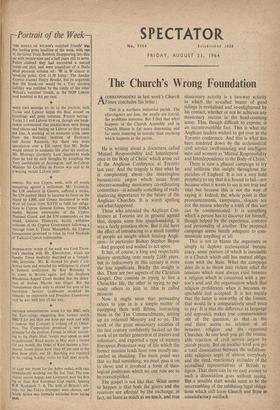The Church's Wrong Foundation
ACORRESPONDENT in last week's Church Times concludes his letter : This is a northern industrial parish. The churchgoers are few, the smells are horrid, the problems immense. But I find that what happens in the Church Assembly and in Church House is far more depressing and far more lowering to morale, than anything which happens in the parish.
He is writing about a d6cument called `Mutual Responsibility and Interdepend- ence in the Body of Christ' which arose out of the Anglican Conference at Toronto last year. And the tragedy is that what he is complaining about—the meaningless bureaucratic jargon which issues from obscure-sounding missionary co-ordinating committees—is actually something of really shattering importance to the future of the Anglican Churches. It is worth spelling out what happened. Those who attended the Anglican Con- ference at Toronto are in general agreed that, despite some fine speech-making, it was a fairly pointless show. But it did have the effect of introducing to a small number of people an insight which leading Angli- cans—in particular Bishop Stephen Bayne —had grasped and wished to act upon. It has, of course, a long and respectable history stretching over nearly 2,000 years, but, its rediscovery in this century is none the less significant. Briefly the insight is this. There are two aspects of the Christian Gospel. One consists in trying to live a Christ-like life, the other in trying to per- suade others to join in (this is called mission).
Now it might seem that persuading others to join in is a simple matter of equipping them with Bibles, instructing them in the Ten Commandments, setting up an ordained Ministry and so on. The work of the great missionary societies of the last century confidently backed up the work of an earlier generation of traders and colonisers, and exported a type of western European Protestant way of life which the former mission lands have now mostly suc- ceeded in shedding. The main point was that we had something; we must pass it on to them; and it involved a form of thed- logical positivism which we can now see to be oversimplified. The gospel is not like that. What seems to happen is that both the givers and the receivers are affected by the exchange; in fact, we learn as much as we teach, and true missionary activity is a two-way activity in which the so-called bearer of good tidings is revitalised and re-enlightened by his contact, whether or not he achieves any missionary success in the head-counting sense. This, though difficult to express, is an incontrovertible fact. This is what the Anglican leaders wished to get over at the Toronto conference. And this is what has been rendered down by the ecclesiastical civil service (well-meaning and intelligent men and women) as 'Mutual Responsibility and Interdependence in the Body of Christ.'
There is now a phased campaign to try and infiltrate this insight throughout the parishes of England. It is not a very bold prophecy to say that it is bound to fail—not because what it wants to say is not true and vital but because this is not the way of saying it. Indeed, the whole point is that pronouricements, campaigns, slogans are not the means whereby a truth of this sort can be communicated. It is something which a person has to discover for himself, though helped by the experience, concern and personality of another. The proposed campaign seems barely adequate to com- municate anything at all.
This is not to blame the organisers or simply to deplore ecclesiastical bureau- cracy, some portion of which is inevitable in a Church which still has mutual obliga- tions with the State. What the campaign does do is to throw into violent relief the tensions which must always exist between a religion which is concerned with a per- son's soul and the organisation which that religion proliferates when it becomes re- spectable and accepted. It is not merely that the latter is unworthy of the former; that would be a comparatively small price to pay. It is that the difference in language and approach makes true communication out of the question, so that in the end there seems no relation at all between religion and the organised Churches. At one level you get the reason- able rejection of civil service jargon by parish priests. But on another level you get a total dissociation between the unfathom- able religious urges of almost everybody and the tired, reactionary attitudes of the accredited representatives of British re- ligion. That there can be no easy answer to such a dissociation goes without saying. But a sensible start would seem to be the unscrambling of the inhibiting legal obliga- tions which still leave Church and State in unsatisfactory wedlock.


































 Previous page
Previous page